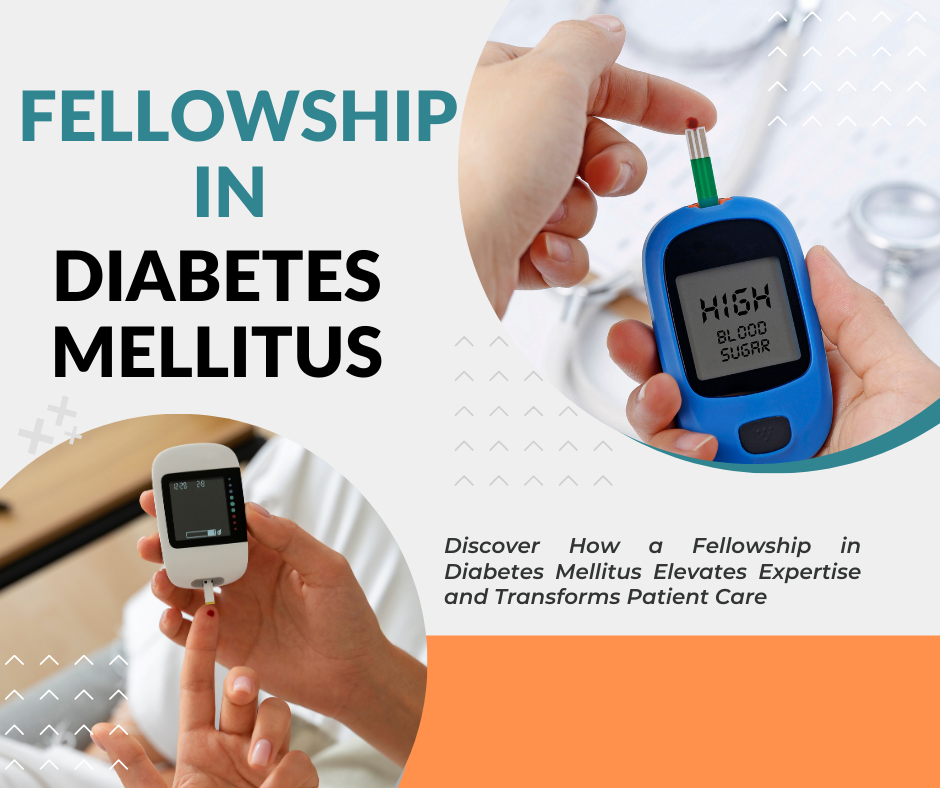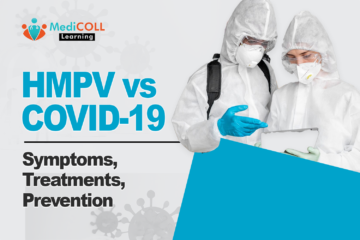
Diabetes mellitus, a chronic condition characterized by elevated blood glucose levels, has become a significant global health concern, affecting millions of people worldwide. Managing this complex and pervasive condition demands specialized knowledge and skills that surpass standard medical education. For healthcare professionals aiming to enhance their expertise in diabetes care, a Fellowship in Diabetes Mellitus offers an invaluable opportunity to gain advanced training. This diabetes mellitus course provides a comprehensive understanding of diabetes management, equipping medical professionals to address the growing demand for specialized care and effectively treat this increasingly prevalent condition.
Understanding Diabetes Mellitus: A Comprehensive Overview
Diabetes mellitus is a long-term metabolic disorder marked by elevated levels of glucose (sugar) in the bloodstream. It occurs when the body either does not produce enough insulin, a hormone responsible for regulating blood sugar or cannot effectively use the insulin it produces. This results in elevated blood glucose levels, which can lead to a range of health complications if not properly managed.
Types of Diabetes Mellitus
1. Type 1 Diabetes:
- Cause: Type 1 diabetes is an autoimmune disorder in which the immune system attacks and destroys the pancreas’s insulin-producing beta cells.
- Onset: It typically develops in childhood or adolescence, but it can occur at any age.
- Management: People with Type 1 diabetes need continuous insulin therapy to effectively control their blood sugar levels.
2. Type 2 Diabetes:
- Cause: Type 2 diabetes mainly involves insulin resistance, where the body’s cells fail to respond properly to insulin. It is often linked to obesity, a sedentary lifestyle, and genetic factors.
- Onset: This type is more common in adults but is increasingly being diagnosed in younger populations, including children and adolescents.
- Management: Type 2 diabetes is often managed through lifestyle changes, oral medications, and, in some cases, insulin therapy.
3. Gestational Diabetes:
- Cause: Gestational diabetes occurs during pregnancy and is caused by hormonal changes that affect insulin’s ability to regulate blood sugar.
- Onset: It typically develops in the second or third trimester and usually resolves after childbirth, but it increases the risk of developing Type 2 diabetes later in life.
- Management: Gestational diabetes is managed through diet, exercise, and, if necessary, insulin or other medications.
4. Other Specific Types: There are also other, less common forms of diabetes, such as monogenic diabetes, which is caused by mutations in a single gene, and diabetes secondary to other medical conditions or treatments.
Symptoms of Diabetes Mellitus
Common symptoms of diabetes mellitus include:
- Frequent urination
- Excessive thirst
- Unexplained weight loss
- Extreme hunger
- Fatigue
- Blurred vision
- Slow-healing sores or frequent infections
In Type 1 diabetes, symptoms may develop quickly, often over a few weeks. In Type 2 diabetes, symptoms may be mild and develop gradually, sometimes going unnoticed for years.
Complications of Diabetes Mellitus
If left untreated or poorly managed, diabetes can lead to a range of serious complications, including:
- Cardiovascular Disease: Increased risk of heart attack, stroke, and atherosclerosis.
- Neuropathy: Nerve damage, particularly in the legs and feet, leading to pain, tingling, or loss of sensation.
- Nephropathy: Kidney damage that may progress to kidney failure.
- Retinopathy: Damage to the retina’s blood vessels, which may result in vision loss or blindness.
- Foot Damage: Poor circulation and nerve damage can lead to foot ulcers and, in severe cases, amputation.
- Skin Conditions: Increased risk of bacterial and fungal infections.
Diagnosis of Diabetes Mellitus
Diabetes is diagnosed through blood tests that measure blood glucose levels. Common tests include:
- Fasting Blood Glucose Test: Measures blood sugar after an overnight fast. A diagnosis of diabetes is indicated if blood glucose levels are 126 mg/dL or higher on two separate tests.
- Oral Glucose Tolerance Test (OGTT): Measures blood sugar before and after drinking a glucose-rich beverage. A level of 200 mg/dL or higher after two hours suggests diabetes.
- Hemoglobin A1c Test: Reflects average blood sugar levels over the past two to three months. An A1c level of 6.5% or higher indicates diabetes.
Management and Treatment of Diabetes Mellitus
The management of diabetes involves a combination of lifestyle changes, medications, and regular monitoring of blood glucose levels. The main goals are to maintain blood sugar levels within a target range, prevent complications, and improve quality of life.
1. Lifestyle Changes:
- Diet: A balanced diet rich in fruits, vegetables, whole grains, lean proteins, and healthy fats is essential. Monitoring carbohydrate intake is crucial for blood sugar control.
- Exercise: Regular physical activity helps improve insulin sensitivity and lowers blood glucose levels.
- Weight Management: Achieving and maintaining a healthy weight can reduce the risk of complications and improve overall diabetes management.
2. Medications:
- Insulin: Essential for Type 1 diabetes and sometimes required for Type 2 diabetes. Insulin can be delivered via injections or through an insulin pump, offering flexibility in diabetes management.
- Oral Medications: Various oral medications help manage Type 2 diabetes by improving insulin sensitivity, reducing glucose production in the liver, or stimulating insulin release from the pancreas.
- Other Injectable Medications: Some non-insulin injectables help regulate blood sugar levels by mimicking the action of certain hormones involved in glucose metabolism.
3. Monitoring:
- Self-Monitoring of Blood Glucose (SMBG): Regular blood sugar testing using a glucose meter or continuous glucose monitor (CGM) helps individuals track their blood sugar levels and adjust their treatment as needed.
- Regular Check-ups: Regular visits to healthcare providers for monitoring and adjusting treatment plans are essential for optimal diabetes management.
Prevention of Diabetes Mellitus
Although Type 1 diabetes cannot be prevented, adopting lifestyle changes can often prevent or postpone the onset of Type 2 and gestational diabetes:
- Healthy Diet: Emphasize a diet rich in fiber, whole grains, and lean proteins while limiting sugar and refined carbohydrates.
- Regular Exercise: Strive for a minimum of 150 minutes of moderate-intensity physical activity each week.
- Weight Management: Keep a healthy weight to lower the chances of developing Type 2 diabetes.
- Regular Monitoring: Individuals with prediabetes or at high risk for diabetes should have regular blood sugar screenings to detect any changes early.
Key Components of the Diabetes Mellitus Course
- Clinical Training: The core of the fellowship involves extensive clinical training in diabetes management. Fellows gain hands-on experience in diagnosing and treating various forms of diabetes, including Type 1, Type 2, gestational diabetes, and other less common forms. Training also includes managing diabetes-related complications such as diabetic neuropathy, retinopathy, nephropathy, and cardiovascular diseases.
- Research Opportunities: Fellows are encouraged to engage in clinical research related to diabetes. This aspect of the program helps them contribute to advancing knowledge in the field, explore new treatment modalities, and stay updated with the latest scientific developments. Research may focus on topics such as the pathophysiology of diabetes, new pharmacological treatments, lifestyle interventions, and the genetics of diabetes.
- Interdisciplinary Collaboration: Diabetes care often requires a multidisciplinary approach. Fellows work closely with other healthcare professionals, including dietitians, diabetes educators, nurses, and ophthalmologists, to provide comprehensive care to patients. This collaboration is crucial in developing a holistic approach to diabetes management.
- Patient Education and Advocacy: Education is a critical component of diabetes management. Fellows learn how to effectively communicate with patients, providing them with the knowledge and tools they need to manage their condition. This includes educating patients about diet, exercise, medication adherence, and monitoring blood glucose levels. Additionally, fellows may engage in community outreach and advocacy efforts to raise awareness about diabetes prevention and management.
- Advanced Technologies: The fellowship also covers the use of advanced technologies in diabetes care, such as continuous glucose monitoring (CGM) systems, insulin pumps, and telemedicine. Fellows gain proficiency in integrating these technologies into patient care to enhance treatment outcomes.
Why Pursue a Fellowship in Diabetes Mellitus?
- Growing Demand: With the global rise in diabetes cases, there is an increasing need for specialists who can provide expert care. A fellowship in diabetes positions at the forefront of this demand, opening up numerous career opportunities in clinical practice, research, and academia.
- Specialized Expertise: Diabetes is a complex condition with various manifestations and complications. This fellowship equips fellows with specialized knowledge and skills that go beyond general medical training, enabling them to provide the highest standard of care to patients.
- Impact on Public Health: As a diabetes specialist, play a crucial role in combating one of the most pressing public health challenges of the time. Work can significantly improve patient outcomes, reduce complications, and ultimately, enhance the quality of life for individuals with diabetes.
- Research and Innovation: The field of diabetes care is rapidly evolving, with ongoing research leading to new treatments and technologies. A fellowship offers the opportunity to contribute to this innovation, helping to shape the future of diabetes management.
Career Opportunities After the Diabetes Mellitus Fellowship India
Upon completion of the fellowship, graduates can pursue various career paths, including:
- Clinical Practice: Working as a diabetologist in hospitals, clinics, or private practice.
- Academic Medicine: Teaching and mentoring medical students and residents while conducting research.
- Research: Engaging in clinical or translational research to develop new treatments and interventions for diabetes.
- Healthcare Administration: Leading diabetes care programs or departments within healthcare institutions.
- Public Health: Working in governmental or non-governmental organizations focused on diabetes prevention and management.
Diabetes mellitus fellowship in India is an excellent opportunity for medical professionals seeking to specialize in the care of patients with diabetes. This advanced training not only enhances clinical skills but also provides a platform for research and innovation in a rapidly evolving field. With the rising prevalence of diabetes globally, specialists trained through these fellowships are essential in meeting the growing demand for expert care and in improving the lives of those affected by this chronic condition.



0 Comments